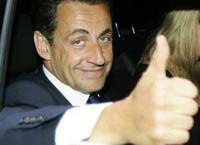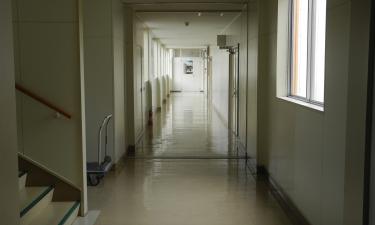Nicolas Sarkozy elected French president
Nicolas Sarkozy, a blunt and uncompromising pro-American conservative, was elected president of France Sunday with a mandate to chart a new course for an economically sluggish nation struggling to incorporate immigrants and their children.

Sarkozy defeated Socialist Segolene Royal by by 53.06 percent to 46.94 percent with 84 percent turnout, according to final results released early Monday. It was a decisive victory for Sarkozy's vision of freer markets and toughness on crime and immigration, over Royal's gentler plan for preserving cherished welfare protections, including a 35-hour work week that Sarkozy called "absurd."
"The people of France have chosen change," Sarkozy told cheering supporters in a victory speech that sketched out a stronger global role for France and renewed partnership with the United States.
There were few reports of unrest, despite fears that the impoverished suburban housing projects, home to Arab and African immigrants and their French-born children, would erupt again at the victory of a man who labeled those responsible for rioting in 2005 as "scum." That abrasive style raised doubts over whether Sarkozy, himself the son of a Hungarian refugee, could truly unite the increasingly diverse and polarized nation.
Sarkozy pledged in his victory speech to be president "of all the French, without exception." But that task will not be easy. The 52-year-old former interior minister inherits a nation losing faith in itself, paralyzed by worries over globalization, bitter at American dominance and saddled with social tensions, the AP reports.
In 2005, Sarkozy referred to youths living in the rundown housing estates outside large cities as "scum" and vowed to mop up the areas with a high-powered industrial cleaning machine.
In Paris and three suburban regions around the capital alone, some 3,000 police officers were deployed Sunday to prevent violence.
After an intense, polarizing campaign, the French went Sunday to polling stations in large numbers.
According to the Interior Ministry based on the vote count, some 84.8 per cent of France's 44.5 million registered voters cast their ballots, one of the highest rates of participation in any postwar French presidential election.
The 53-year-old Royal, a former environment and education minister, would have become the first woman president of France if she had been elected.
She had promised to enact laws to protect battered women, raise the minimum wage and maintain the number of civil servants but to move workers from public sectors where they are not needed, such as customs services, to areas where they are sorely lacking, such as clinics and hospitals.
However, she ran a poor campaign and never managed to convince the French that she had the stature to be president, DPA reports.
European Union leaders congratulated Sarkozy, who promised to put France back into the driving seat of Europe after the country voted down the EU constitution in a 2005 referendum.
"Tonight France is back in Europe," he said.
U.S. President George W. Bush also telephoned to offer his congratulations and said he expected good relations with Sarkozy, who has made a priority of repairing the damage to French-U.S. relations caused by tension over the Iraq war.
Sarkozy said France would be Washington's friend, but urged the United States to do more to combat global warming.
The Socialists portrayed Sarkozy as a danger for France, saying he was authoritarian and likely to exacerbate tensions in the poor, multi-racial suburbs that ring many French cities and where the epicentre of three weeks of rioting in 2005.
Thousands of extra police were drafted in to patrol sensitive suburbs on Sunday and there were skirmishes between leftist sympathisers and police in Paris, Toulouse and Lyon.
Police said a number of cars were also set alight in suburbs around Paris, but there were no exact figures, Reuters reports.
Source: agencies
Prepared by Alexander Timoshik
Pravda.ru
Subscribe to Pravda.Ru Telegram channel, Facebook, RSS!




